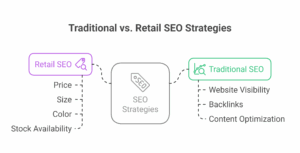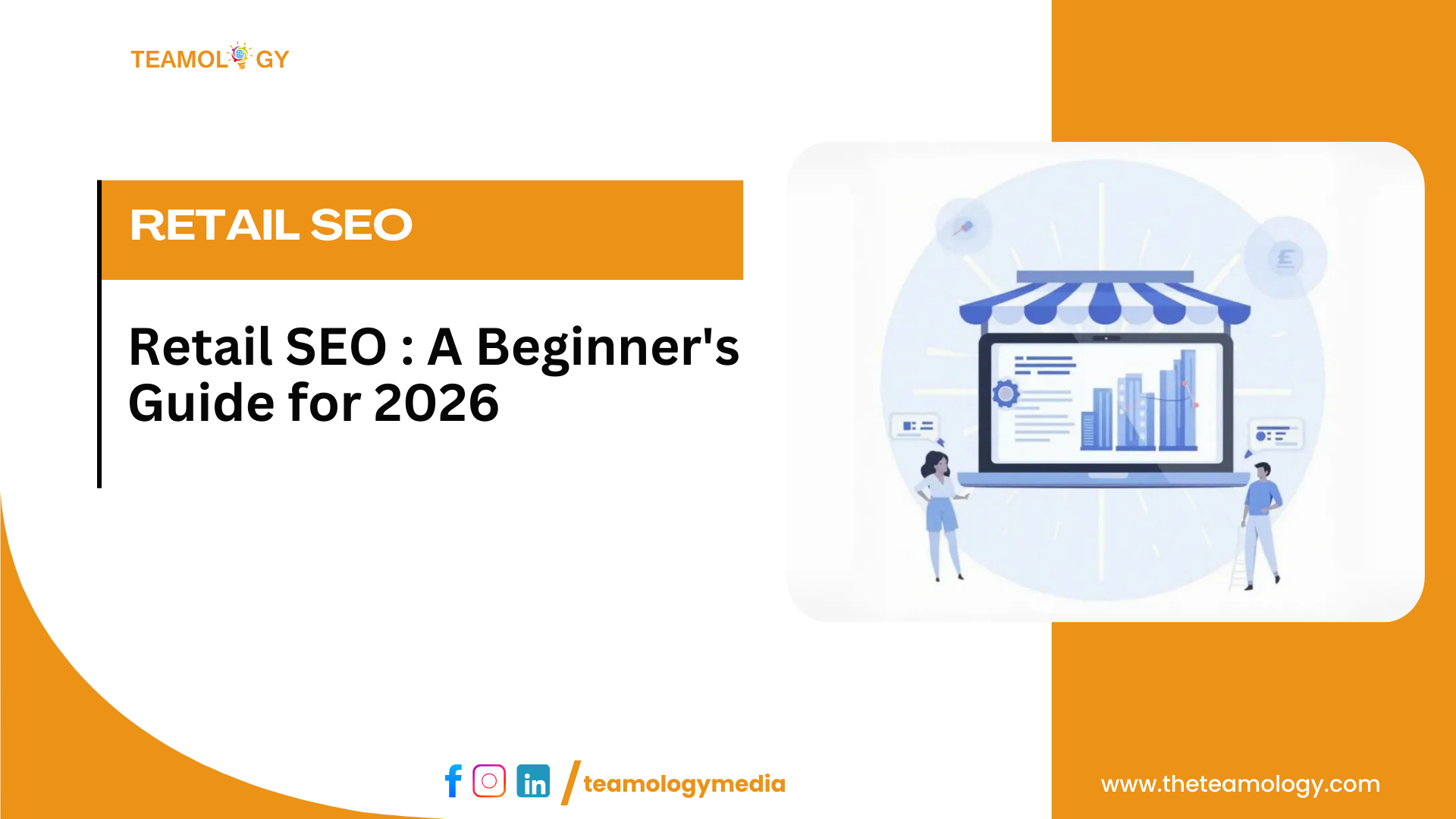Introduction
Are you tired of your amazing products getting lost in the e-commerce noise? In today’s blog, we’re diving deep into SEO for Retail —the secret weapon to surviving and thriving in the cutthroat online marketplace. We’ll go beyond the basics, showing you how to drive significant traffic, boost your rankings, and convert clicks into loyal customers. Get ready to unlock the advanced strategies and technologies defining e-commerce success tomorrow.
Retail SEO: Powerful Weapon for Modern-day E-commerce

Traditional Vs. Retail SEO
Retail SEO is the branch of search engine optimization specifically designed for both e-commerce platforms and brick-and-mortar stores. In this approach, each product page isn’t merely a collection of separate elements; rather, it serves as the space where the buyer’s interest, preferences, and decision-making process unfold.
Unlike traditional SEO strategies, which focus on overall website visibility, backlinks, and content optimization, SEO for retail businesses pays meticulous attention to the details of each product, such as price, size, color, and stock availability. These strategies ensure that when a prospective customer searches for information about a specific product, they will find your page right away.
Why is Retail SEO Essential in 2026?
In today’s digital world, particularly with the advent of intelligent engines and AI-powered search tools (e.g., ChatGPT, Google Gemini), search patterns and user expectations have undergone significant changes. Shoppers are no longer just searching for general keywords. Still, they are using conversational, specific, and context-rich queries, such as “Buy red sneakers size 9 for rainy weather” or “Nike marathon shoes under ₹5000.”
Also, Google’s Search Generative Experience (SGE) and zero-click results are reducing traditional organic clicks. This means optimizing for featured snippets, “People Also Ask” results, and rich media content is no longer optional—it’s vital for visibility.
In addition, new features like the shopping graph, voice search, and visual search are making retail SEO more effective and relevant. Therefore, if you want to prepare your e-commerce business for the future, the importance and implementation of these strategies are essential.
The Future of Retail SEO: AI-Driven Strategies & E-commerce Trends for 2026+
With the rapid advancement of technology, artificial intelligence (AI) has become an indispensable part of every business. In retail SEO, the application of AI-based tools and strategies enables more effective content optimization, customer behavior analysis, and personalization.
1. Generative AI and SEO (Answer Engine Optimization – AEO)
Generative AI can help you present your product data so shoppers can find it more easily in search results. For example, using an LLM (Large Language Model) to organize product details into a machine-readable format will improve their appearance in associated search snippets.
2. Hyper-Personalization
Providing dynamic recommendations based on the buyer’s behavior, their geographic location, browsing history, etc., not only increases conversions but also builds a deeper relationship with the buyer. To convert website visitors into loyal customers, you have to know their choices. Hyper-personalization helps in that regard.
3. Importance of Visual and Voice Search
Today’s shoppers are not just typing; they are also searching for information through images or voice commands. Adding product data and FAQ schema using tools like Google Lens, Alexa, or the Google Assistant helps you connect with shoppers more easily through visual and voice search.
4. Social Commerce & Retail SEO
Platforms like Instagram Shops, TikTok Shop, and Facebook Marketplace are no longer just branding tools; they are fully functional shopping ecosystems. Using social media to optimize product listings for visibility across these platforms and syncing feeds with your store via tools like DataFeedWatch or Productsup can dramatically improve your reach and conversions.
5. E-E-A-T and Brand Authority
Search engines now favor brands that demonstrate Experience, Expertise, Authoritativeness, and Trustworthiness (E-E-A-T). You can boost your retail SEO by including:
- Verified user reviews and testimonials.
- Detailed product usage videos or blog posts by experts.
- Transparent brand values (especially for sustainability).
- Author bio/schema for product guides.
6. First-party Data and Privacy-Driven Personalization
With the end of third-party cookies, your ability to collect and use first-party data (such as browsing history, purchase behavior, and CRM data) becomes vital. This data powers AI-driven personalization, product recommendations, and tailored content that aligns with both SEO and CRO (Conversion Rate Optimization).
Effective Tools and Resources: Work Smarter, Not Harder
Use the following tools to achieve the highest level of success:
Free Tools:
- Google Search Console: Helps analyze search performance and coverage reports.
- Google Merchant Center: Enables the correct display of your products on Google through product feed management.
- Rich Results Test and Mobile-Friendly Test: Verifies the rich results and mobile-friendliness of websites and product pages.
Paid Platforms:
- SEMrush: Excellent for keyword research, backlink analysis, and position tracking.
- Ahrefs: Excellent for keyword research, backlink analysis, and position tracking.
- Screaming Frog: Helpful for site audits and checking for duplicate content.
- DataFeedWatch Streamlines multi-channel integration for product feed management, enabling e-commerce businesses of all sizes to easily adapt their feeds for various ads and marketplaces.
- Productsup: Delivers powerful multi-channel integration for product feed management, designed for large enterprises requiring complex data and global content needs.
Each tool and platform will strengthen your SEO strategy, enabling your website and product pages to rank higher in search results.
Conclusion: Prepare for the digital marketplace of the future
Retail SEO is not merely about elevating your product pages in search engine results; it’s a crucial process for building buyer trust and streamlining their purchasing journey. Maintaining your brand’s presence in social media is equally important, and in today’s intensely competitive digital marketplace, having excellent content or superior products alone is insufficient. You require a well-defined strategic and technical approach that anticipates and meets evolving buyer expectations.
The strategies outlined above—encompassing keyword optimization, on-page and technical SEO, local inventory integration, AI-powered enhancements, social commerce, visual/voice search, and new SERP formats like SGE—will make your website a valuable asset to search engines from every perspective. By meticulously analyzing performance data across various touchpoints and deeply understanding buyer needs, you can develop a distinctive, personalized SEO strategy that will redefine your presence within the dynamic e-commerce landscape.
Ready to fortify your digital footprint through cutting-edge retail SEO and AI-driven tactics? Seize this opportunity by scheduling a complimentary consultation. Our seasoned experts are prepared to assess your business’s current standing and deliver rapid, effective solutions.
Contact us or book your free consultation today and gain a decisive competitive advantage – your path to online retail success is just a click away!


